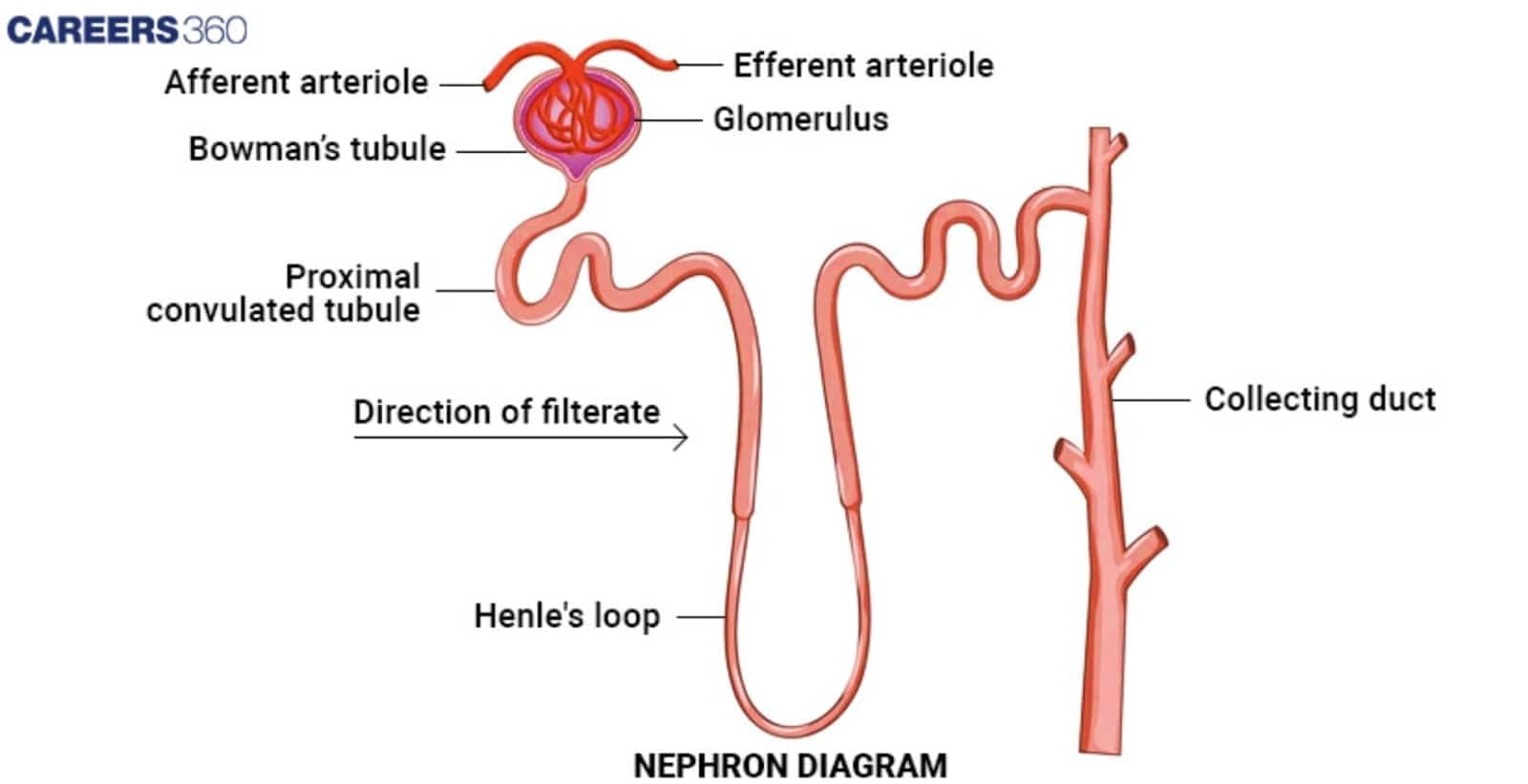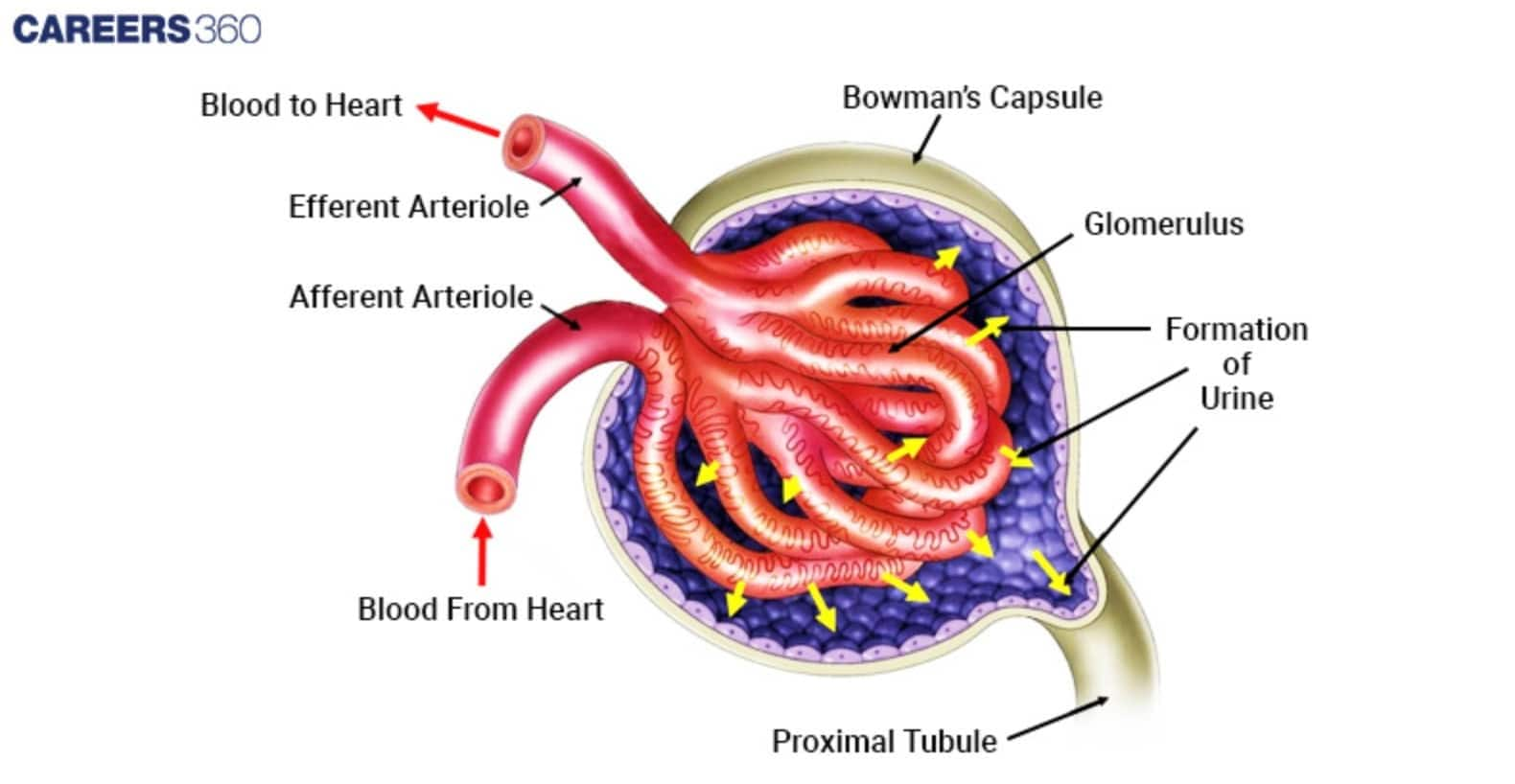Glomerular Filtration Rate
Glomerular Filtration Rate (GFR) is the volume of plasma filtered per minute by all functioning nephrons, making it the most crucial indicator of kidney function. GFR depends on glomerular blood pressure, filtration membrane integrity, and the relative resistance of afferent and efferent arterioles. This guide covers nephron anatomy, filtration mechanism, filtration barrier, factors affecting GFR, diagrams, FAQs, NEET MCQs, and exam-focused notes.
This Story also Contains
- What Is The Glomerular Filtration Rate (GFR)?
- Anatomy & Physiology Of The Nephron
- Role Of The Glomerulus In Filtration
- Glomerular Filtration Process
- Factors Influencing GFR
- Pathological Conditions Affecting GFR
- Juxtaglomerular Apparatus NEET MCQs (With Answers & Explanations)
- Recommended Video for "Glomerular Filtration Rate"

What Is The Glomerular Filtration Rate (GFR)?
The GFR is a measure of a renal function expressed in millilitres per minute and represents the rate at which plasma infiltrates through glomeruli found in the nephrons to form urine. It is one of the most important indicators of the kidney, for it represents the efficiency and health concerning the removal of waste and too much of anything in the blood.
The nephron is the functional unit of the kidney and contains the glomerulus, which is a network of capillaries where filtration occurs. The glomerulus filters the blood, and that filtrate moves into the tubules. The optimum GFR for proper body functioning is of importance in maintaining the balance of metabolic waste removal and fluid, electrolyte, and acid-base balances.
Anatomy & Physiology Of The Nephron
The nephron is the smallest unit of structure in the kidney that undertakes its function. It consists of a few components, all necessary: the glomerulus, Bowman's capsule, proximal convoluted tubule (PCT), loop of Henle, distal convoluted tubule (DCT), and the collecting duct. Every part of the nephron plays a clear role in the process of filtering blood such that it eventually becomes urine.

Role Of The Glomerulus In Filtration
The network of capillaries encased by Bowman's capsule is known as the glomerulus. It is the place within the blood plasma where filtration occurs. Since the blood pressure inside the glomerular capillaries is so high, it pushes out water, ions, and small solutes from the blood to Bowman's capsule, thus forming the glomerular filtrate. This is the first step in the formation of urine and an important process for clearing waste products and extra substances from the blood.

Glomerular Filtration Process
The process of glomerular filtration involves:
Mechanism Of Filtration
Filtration occurs because of the high pressure the blood creates when entering the glomerulus through the afferent arteriole. This filtration is via a specialised filtration barrier.
Blood enters the glomerulus through the afferent arteriole and exits through the efferent arteriole. The relative diameter between the two arterioles creates a pressure gradient encouraging filtration.
Filtration Barrier (Three Layers)
The filtration barrier consists of three layers:
Endothelium: The inner lining of the glomerular capillaries, which is perforated with fenestrations (pores) that allow plasma to pass through but at the same time block blood cells.
Basement Membrane: A thin, gel-like matrix supporting the structure of the basement membrane and allowing those molecules, mostly large proteins, to pass through the space.
Podocytes: These are special epithelial cells that wrap the capillaries with their footlike extension, forming filtration slits to bar larger molecules.
Factors Influencing GFR
The factors influencing GFR
Systemic Blood Pressure
High blood pressure elevates GFR by increasing the pressure gradient in the glomerulus, whereas low blood pressure will lower the GFR.
Blood Volume
An increase in blood volume will result in high blood pressure hence elevates GFR by increasing the amount of plasma available for filtration.
Plasma Protein Levels
Plasma protein concentration changes the osmotic pressure and, hence, the GFR. If the plasma protein concentration is higher, there would occur a reduction in GFR since more water is re-absorbed in the capillaries.
Pathological Conditions Affecting GFR
Several pathologies of the glomerulus compromise the filter, hence lowering GFR Pathological conditions affecting GFR are:
Glomerulonephritis
Inflammation of the glomeruli damages the filtration membrane, reducing GFR and allowing proteins or blood cells to leak into the urine.
Diabetes
Long term high glucose injures glomerular capillaries that impairs normal filtration.
Hypertension
Persistently elevated blood pressure strains and hardens renal blood vessels, decreasing blood flow to nephrons and lowering GFR.
Kidney Injury
Acute or chronic damage to nephrons from toxins, infections, or trauma disrupts filtration efficiency and causes a rapid decline in GFR.
Juxtaglomerular Apparatus NEET MCQs (With Answers & Explanations)
Important questions asked in NEET from this topic are:
Glomerular Filtration Process
Factors affecting GFR
Practice Questions for NEET
Q1. How much blood passes through the kidneys per minute in a healthy person?
125-150 ml
600-700 ml
1100-1200 ml
500-600 ml
Correct answer: 3) 1100-1200 ml
Explanation:
The term glomerular filtration rate (GFR) refers to the volume of filtrate produced by the kidneys per minute. Approximately 1 to 1.2 liters of blood go through the kidneys each minute in a healthy individual. Renal blood flow is the term for this. In order to help the body maintain the proper balance of fluids, electrolytes, and other vital components, the kidneys filter this blood to eliminate waste and excess substances.
Hence, the correct answer is option 3) 1100-1200 ml.
Q2. The quantity of glomerular filtrate formed each minute in all the nephrons of both kidneys is called.
Glomerular Filtration Rate (GFR)
Filtration fraction
Net Filtration Rate
Glomerular Filtration Fraction
Correct answer: 1) Glomerular Filtration Rate (GFR)
Explanation:
Glomerular Filtration Rate (GFR) refers to the amount of glomerular filtrate formed each minute across all the nephrons in both kidneys. It is a key indicator of kidney function, reflecting how effectively the kidneys filter blood. In a healthy individual, the normal GFR is approximately 125 ml per minute, which equates to about 180 liters per day. This filtration rate ensures the kidneys effectively remove waste products and excess substances from the blood, maintaining fluid and electrolyte balance in the body.
Hence, the correct answer is option 1) Glomerular filtration rate (GFR).
Q3. A fall in glomerular filtration rate (GFR) activates
juxtaglomerular cells to release renin
adrenal cortex to release aldosterone
adrenal medulla to release adrenaline
posterior pituitary to release vasopressin.
Correct answer: 1) juxtaglomerular cells to release renin
Explanation:
The JGA plays a complex regulatory role. A fall in glomerular blood flow/glomerular blood pressure/GFR can activate the JG cells to release renin which converts angiotensinogen in blood to angiotensin I and further to angiotensin II. Angiotensin II, being a powerful vasoconstrictor, increases glomerular blood pressure and thereby GFR.
Hence, the correct answer is option 1) juxtaglomerular cells to release renin.
Also Read:
Recommended Video for "Glomerular Filtration Rate"
Frequently Asked Questions (FAQs)
If one has the factors to increase the chance of having kidney disease such as diabetes, hypertension, or family kidney diseases, then have his GFR checked annually. For others, occasional monitoring during your periodic general health check-up is typically.
NSAIDs, some antibiotics, and medications for the treatment of high blood pressure, and diabetes can change the work of the kidneys.
A low GFR may indicate mild kidney malfunction or chronic kidney disease (CKD). It is a caution that the kidneys are not filtering waste and excessive fluids from the blood effectively, hence their possible medical evaluation and management to lower risks of developing further damage to the kidneys.
An average adult with normal GFR measures about 90 mL/min/1.73 m² or more. It changes a little bit with age and exhibits an overall decline with an increase in age. You are best placed to consult a health provider, to know what normal looks like in your age group.
Staying healthy is the best natural way to enhance GFR. This would include ensuring good hydration with adequate fluid intake and healthy dietary choices low in salt with an abundance of fruits and vegetables, regular exercise, non-smoking, avoidance of excessive alcohol use, and treatment of co-existing conditions like hypertension or diabetes.
